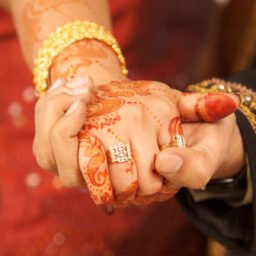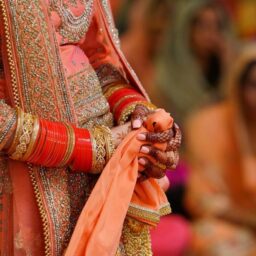INTRODUCTION
In India, widowhood is considered a curse, and a woman is accused of being a “Husband Eater” once her husband dies. Widows’ rights have historically been discriminated against on the basis of religion, class, and caste, particularly when it comes to remarriage. They were also mentioned in relation to the conditions of her widowhood, such as isolation, exclusion, non-participation in social gatherings, and so on. For them, being a widow is not just a curse, but also a punishment for wrongdoings they did not commit.
In sum, their situation in India is truly heart-breaking. Widows have been subjected to various forms of marginalisation, such as being sent back to their parents’ homes without any property rights of their own, or being isolated and excluded from social interrogations. Widows were also forced to jump into the pyres of their deceased husbands during historic times, a practice known as “Sati Pratha,” which was abolished by Governor-General Lord William Bentinck in British India.
The Hindu Widow’s Remarriage Act, 1856, came into effect in 1856, during British control, and it permitted the remarriage of Hindu widows.
In Sanjay Purshottam Patnakar vs. Smt. Prajakta Pramod Patil[1], a petition was filed against an order of succession certificate issued in favour of Prajakta Pramod Patil, a widow of the Appellant’s brother, Prakash Purshottam Patnakar, claiming that because she had remarried to Pramod Patil, the succession certificate was null and void and that she had lost all her rights.
The clause of the Hindu Succession Act, 1956 was deemed to be superior to the abolished Hindu Widows’ Remarriage Act, 1856. All preceding enactments have been superseded by Section 4 of the Hindu Succession Act, 1956. The Hindu Succession Act of 1956 made no provision that was pari materia with Section 2 of the Hindu Widows’ Remarriage Act of 1856.
Further, the court held that a widow can claim her deceased husband’s property. even after remarriage, since she is a class 1 heir and her deceased husband’s family is a class 2 heir.
Chando Mehtain & Ors vs. Khublal Mahto & Ors.[2], Rukmini Debi, the widow of Nanku Mahnto, one of Khubo Mahnto’s successors, filed a partition suit for the ancestral property of Khubo Mahnto, but she was not made a party to the suit since she was remarried to Chandar Mahnto.
The Apex Court ruled in this case that the Hindu Widows Remarriage Act, 1956, was not scrapped by the Hindu Succession Act, 1956[3], because Section 4 of the latter Act had an overriding effect, rendering the Hindu Widows Remarriage Act, 1856, ineffective.
According to Section 4 of the Hindu Succession Act[4], all existing laws, be it in the form of enactments or otherwise, that vary from any of the provisions of the Act, will cease to apply to Hindus. As a result, it was determined that Rukmini Debi had inherited all the properties left by her late husband after the Succession Act was passed and that she could not be deprived of those properties upon remarriage.
WIDOW’S LEGAL REMEDIES IF RIGHTS TO FORMER HUSBAND’S PROPERTY ARE DENIED
- She can serve legal notice on the party disputing her rights to the property of her late husband.
- She can sue in civil court for partition, claiming her portion.
- If the partition of such property is not conceivable, the court may auction the property and award the woman her portion.
- She can also seek an injunction to prevent the property from being sold while the lawsuit is pending.
- If the property is sold without her permission, the widow can name the purchaser as a defendant in the lawsuit.
WIDOW’S RIGHTS UNDER THE HINDU SUCCESSION ACT
The Hindu Widow’s Remarriage Act, 1856, was the law in effect during the British era. If a Hindu widow married again, she was asked to give up all the property rights or maintenance left by her deceased husband (including self-acquired and joint family property).[5]
As a result, the law is widely misunderstood. Even though customary law allowed her to keep her possessions, many Hindu families were opposed to widows’ right to remarry. Under the law, widows were stripped of their rights when they became “unchaste,” which was very ambiguous.
This approach was maintained at the request of reformers until the early twentieth century when it was criticized for being arbitrary. During this time, The Hindu Women’s Property Rights Act of 1937[6] was passed. Under this rule, single widows and those widows who didn’t remarry also had rights to maintenance and property from the joint family inheritance. Things began to change and grow when the Hindu Succession Act and the Hindu Marriage Act were passed in 1956.
THE RIGHTS OF WIDOWS TO THEIR PROPERTY
Section 14 (1)[7]states that any asset acquired by a Hindu woman, whether acquired before or after the Act’s enactment, will be held in her name as a full owner.
Under Section 2 of the Hindu Widow Remarriage Act 1856[8], a widow who gets married again after her first former husband’s death need not have to give up her right to her former husband’s property, according to the Bombay High Court. This was discovered when a man (the deceased’s brother) complained to his remarried sister-in-law that she should not have any right to inherit her former husband’s property. The High Court, on the other hand, decided that she is still a Class-I heir of her deceased husband and should inherit.
By virtue of Section 14, a widowed mother inherits her share along with other heirs. In the case of Jayalakshmi vs. Ganesh Iyer[9], this was upheld. Whether she is remarried or divorced, she is eligible to inherit from her son. Adoptive mothers are included in this definition of mother. Furthermore, if there is an adoptive mother, the blood mother will have no claim to the estate of the intestate. A mother has the right to inherit the property of her illegitimate son under Section 3 (I).
SHARES OF THE PROPERTY
The following is the order of succession as per Section 8 of the Hindu Succession Act, 1956[10], which establishes the general norms of succession in the case of males:
- Class-I heirs, which comprise the deceased man’s children, widow, mother, and other relatives.
- Second to Class-II are his father, siblings, and other relatives.
- The deceased’s offspring (male relatives) is ranked third.
- Fourth, the deceased’s cognates (those related to a female).
The court held that even if a widow remarried, she would qualify as a Class-I heir, and her late husband’s family would be the Class-I heir. According to the judgment, even if a woman marries, she retains her right to her late husband’s property, both movable and immovable.
The Hindu Succession Act prohibits a woman from pursuing division in respect of a joint family dwelling unless the male heir chooses to seek partition of the property to divide the separate portions. As a result, A will have to wait until the legal heirs are divided by the head of her former husband’s family.
PROPERTY DISTRIBUTION TO THE WIFE AND OTHER LEGAL HEIRS
- If there is a shared ownership agreement in place —
- Tenancy by full or joint tenancy with survivorship—the property passes to the woman when the husband dies.
- Tenancy in common – The legal heirs of the former spouse become the joint owners, & the property is divided based on the Hindu Succession Act, as appropriate.
- If it can be proven that- in the case of joint property between husband and wife-
- The property is held by the husband, but it is in joint names; according to the law, the whole estate is divided among legitimate heirs, including the wife.
- The house was purchased solely with the wife’s salary and is held in joint names; the woman is the only owner of the property.
The land is split according to the donations made, and the woman obtains her portion as a legal successor on her husband’s side.
THE PROPERTY EARNED BY ONESELF OR INHERITED FROM ONE’S ANCESTORS
Unless her husband dies intestate, the woman has the right to inherit her spouse’s estate only after his death, according to Hindu law. According to the Hindu Succession Act of 1956, a man’s wife is included among the Class I heirs of a man who dies intestate, and she acquires the same proportion as the other legal heirs of the estate.
- If the property is obtained by the husband via self-acquisition and he dies intestate, the widow inherits as a Class I heir.
- It is possible to claim an ancestral interest in one’s husband’s property, but a woman has no control over how that property is distributed. As a class I legal heir, she is entitled to receive her portion of the ancestral property when the estate is divided.
Author(s) Name: Jahnavi K Sharma (Student, Symbiosis Law School, Pune)
References:
[1] SC 2015 BOM 2217
[2] AIR 1983 Patna 33
[3] https://indiankanoon.org/doc/685111/
[4] https://indiankanoon.org/doc/615438/
[5] https://economictimes.indiatimes.com/bangalore/property-rights-of-women/articleshow/1910002.cms?from=mdr
[6] https://indiankanoon.org/doc/80896406/
[7] https://indiankanoon.org/doc/1871141/
[8] https://indiankanoon.org/doc/69412968/
[9] AIR 1972 Mad 357
















